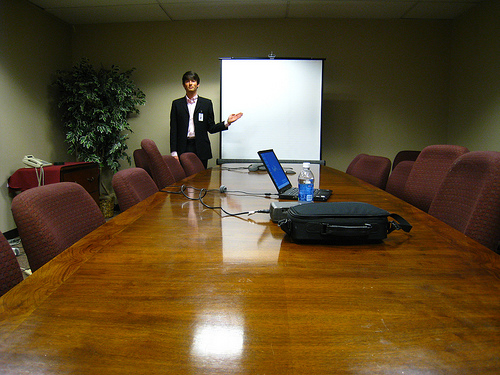Admittedly, it was hard to get fired up about a book focused on meetings. After all, meetings are the bane of corporate existence right?

However, this book was released by The Domino Project, so that was my first clue it would be good.
Yet, Read This Before Our Next Meeting wasn’t just a good book.
In fact, it really isn’t a book. It’s a manifesto. There’s a difference.
There was passion and energy in this manifesto. A passion and energy I have never observed about how to make meetings better.
For those of you who aren’t readers, and especially aren’t readers of manifestos about meetings, rest assured. This manifesto can be read in about an hour and it’s well worth your time.
Al Pittampalli is a corporate culture warrior trying to change the way modern meetings are conducted. I can say that if all companies adopted his philosophy meetings would be more substantial and effective.
So here’s the breakdown of the manifesto:
1. Al says that meetings should only be called when a decision has already been made. The purpose of a meeting is to debate the decision, propose alternatives, make suggestions, or address any concerns. In addition, different teams and departments can coordinate to make their action plan.
2. The modern meeting starts on time, moves fast, and ends on schedule.
3. Modern meetings are small. Only those critical to debate the decision should be there.
4. Everyone is prepared. If they’re not, they will be asked free to leave.
5. The point of a modern meeting is an action plan. What are we doing? Who will do what? When will actions be completed?
6. Everyone is expected to have read all pertinent memos prior to the meeting.
7. The modern meeting only works in a corporate culture where brainstorming is valued. The brainstorming happens separate from a modern meeting.
Some of my favorite quotes from the manifesto are:
“If an operating room were as sloppily run as our meetings, patients would die.”
or
“We’re now addicted to meetings that insulate us from the work we ought to be doing.”
It’s so true.
The manifesto is an insightful and strategic take on how we can make meetings better.
However, it’s much more than that.
The reason this manifesto resonated so much with me is because it’s really about how to make work life better.
Instead of spending time at work in meetings and trying to get buy in, and trying to communicate, and trying and trying. If we adopt Al’s philosophy we can spend our time doing.
That’s when the real fun begins because we get to do the work. Work we enjoy.
To purchase Read This Before Our Next Meeting go here. (Not an affiliate link)
What’s your take on the manifesto?
*Photo Credit: Engin Erdogan (Creative Commons)

Hi! I really like the ideas in the manifesto, but I want to figure something out about the numbered points for the modern meeting. are the things suggested in the first point: ” debate the decision, propose alternatives, make suggestions, or address any concerns” all supposed to happen in the meeting itself? if so, if relevant points come up, is it possible to move forward with the rest of the “let’s make things happen” type of meeting points in step 2-7? Or is – debate, propose, suggest and address all supposed to happen before the modern meeting begins?
Emily – Yes, according to Al, the things suggested in the first point are supposed to happen in the meeting itself. He says the point of the meeting is to either 1) debate the decision that has already been made or 2) coordinate efforts to begin moving forward with the decision. In other words, modern meetings are not used to make a decision. That should have already occurred.
He doesn’t spend too much time on what happens during the debate. I think if relevant points come up he would say that they are to be discussed and debated during the meeting. The key is to have already made a decision about next steps. That decision can change as a result of the debate.
Emily – Yes, according to Al, the things suggested in the first point are supposed to happen in the meeting itself. He says the point of the meeting is to either 1) debate the decision that has already been made or 2) coordinate efforts to begin moving forward with the decision. In other words, modern meetings are not used to make a decision. That should have already occurred.
He doesn’t spend too much time on what happens during the debate. I think if relevant points come up he would say that they are to be discussed and debated during the meeting. The key is to have already made a decision about next steps. That decision can change as a result of the debate.